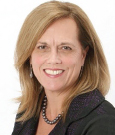Although genetic testing has not turned up any inherited mutations that might explain the number of cancers that have plagued my immediate family, over the past 15 years, I have lost my father, aunt, and sister to the disease. In 2001, my husband, Wayne, died of acute promyelocytic leukemia, and the following year, I was diagnosed with breast cancer. Determined not to make my young daughter an orphan, I decided to take aggressive steps to save my life.
When my sister was diagnosed with breast cancer in 2000 (she died in 2002), I enrolled in a breast cancer prevention program at a breast center near my home. The program required that I have a fine-needle biopsy every 6 months to check for any changes in my breast cells.
My first biopsy showed epithelial hyperplasia cells in my left breast, and atypical hyperplasia cells were found in that breast at the next biopsy. Worried that these cells would soon turn into cancer, I made the decision to have a contralateral prophylactic mastectomy after consulting with my sister’s oncologist. I know that my actions seem drastic, but 10 days after the surgery, the pathology report from the breast tissue showed that I already had cancer. Actually, I had two types of breast cancer in my left breast: ductal carcinoma in situ and stage I invasive ductal carcinoma.
Although biopsies of 17 lymph nodes removed from my under my left arm did not find any spread of cancer, I soon made another controversial choice. Because my aunt had died of ovarian cancer, my oncologist recommended that I have a prophylactic oophorectomy and hysterectomy. Anxious to be as proactive as I could to prevent any additional cancer and to be around to raise my daughter, I agreed. I’ve never regretted those decisions, and today I remain cancer-free.
Thankfully, my daughter, who is now 25 and enrolled in the same breast cancer prevention program, is healthy. Recently, she and I had genetic sequencing on 28 genes associated with hereditary cancer, and we do not have any mutations, so I’m hopeful that cancer ends with me.
Dedicated to Patient Advocacy
Having had cancer and losing so many loved ones to the disease led me to dedicate my life to patient advocacy and education, so that other cancer survivors can have the most accurate information they need to make the best informed decisions about their health care. It is my conviction that informed and educated patients will find a way to get better care than patients who are not proactive in their medical decisions, and they will live longer. I saw how effective being proactive was in my own medical care, and I witnessed its impact on my husband’s care as well.
When Wayne was diagnosed in 1994 with acute promyelocytic leukemia, his chance of surviving more than 3 years was about 20%. Multiple rounds of grueling chemotherapy and a bone marrow transplant had only limited effect on his cancer, sending him in and out of nine remissions.
In 1996, we read about an experimental therapy called arsenic trioxide being tested in Shanghai, China, in the treatment of acute promyelocytic leukemia. After getting permission from the U.S. Food and Drug Administration (FDA) to bring arsenic trioxide into this country for compassionate use, we flew to China to obtain the drug. Wayne’s oncologist then obtained approval from his center’s Institutional Review Board to administer the therapy.
The drug enabled Wayne to live 7 years—4 years beyond his prognosis—long enough to give our young daughter a lasting memory of her father. (Arsenic trioxide [Trisenox] is now approved by the FDA in the treatment of relapsed/refractory acute promyelocytic leukemia.)
Knowledge Really Is Power
I know treating cancer has never been more complex and oncologists have limited time, but one of the most important components of good medical care is providing patients with the tools they need to make educated decisions about their care. I know it sounds cliché, but knowledge really is power.
Cancer has taught me the importance of being your own best advocate in your health-care decisions. Neither Wayne nor I was going to stop asking questions and pursuing information about our cancers until we got what we needed to be informed partners with our oncologists in deciding the appropriate course of treatment for our diseases, and it is what I encourage other patients and survivors to do as well.
Being a well-informed patient allowed my husband Wayne to have many productive years after his diagnosis and give his family the gift of a lasting legacy of his accomplishments. It also allowed me to be cured of cancer, to remarry, to see our daughter grow into a wonderful adult, and to make it my mission to ensure that every patient with cancer gets the same chance at a longer life. ■
Ms. Atwood lives in Lake Quivira, Kansas, and is the Founder and Publisher of Patient Resource, an educational publishing company for people with cancer. In 2012, Ms. Atwood was recognized for her patient advocacy efforts with the Bloch Cancer Survivorship Award, which honors cancer survivors who have made a difference in patients’ lives.


